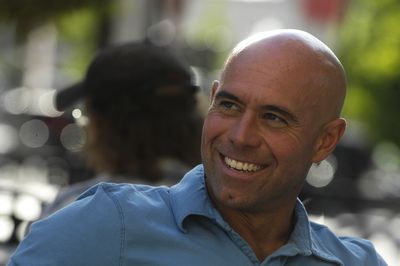Gay pilot challenging ‘don’t ask, don’t tell’ policy
Officer faces early discharge after 18-year Air Force career

BOISE – Barack Obama’s campaign promise to scrap the military’s “don’t ask, don’t tell” policy gave Lt. Col. Victor Fehrenbach hope. Now the aviator is wondering if the president will deliver in time to save his 18-year Air Force career.
The recipient of nine air medals for distinguished service in flight, including one for heroism the night U.S. forces captured Baghdad International Airport in 2003, Fehrenbach is in the process of getting kicked out of the military a year after an acquaintance told his bosses he was gay.
He thought he could hang on until the government eliminated the military’s policy forcing gays and lesbians to keep their sexual orientation secret, but now he isn’t so sure.
Obama “was someone who had experienced discrimination firsthand, and that’s why I had a lot of faith,” Fehrenbach said. “I thought, OK, I can fight this, and maybe by January Obama could be inaugurated and this won’t matter.
“That hasn’t happened.”
The Servicemembers Legal Defense Network, an advocacy group seeking equal treatment of gays in the military, estimates that more than 200 service members have been discharged under “don’t ask, don’t tell” since Obama was sworn into office.
Fehrenbach, 39, is the son of an Air Force veterans – his father was a lieutenant colonel who died when he was 9 and his mother is a former military nurse who lives in Ohio. Last week he told his relatives he is gay, was being discharged from the Air Force and was going on national television to talk about it.
“Now, I’m not hiding anything,” said Fehrenbach, who has appeared on Rachel Maddow’s MSNBC’s talk show and remains on active duty at the Mountain Home Air Force Base in the Idaho desert, about 60 miles southeast from Boise. “For 18 years, I played by the rules, and I kept my private life private.”
Most of the estimated 13,000 service members discharged under “don’t ask, don’t tell” since the law was enacted in 1993 have opted to leave quietly and close the final chapter of their military careers in private. Groups calling for the repeal of the ban, however, say Fehrenbach is among a growing number who are going public with a newfound sense of urgency.
In September, Fehrenbach had decided to accept an honorable discharge and waive his right to a military hearing, where he would have to lie about being gay to stay in the Air Force. He refused.
“I just wanted this to go away, I didn’t tell anyone, I didn’t want anyone to know,” Fehrenbach said.
He quickly changed his mind and with encouragement from five close friends, one a fellow service member, he rescinded the waiver and tried to stall the hearing that would determine his military fate.
The military hearing was delayed until April, when Fehrenbach was told he had been recommended for an honorable discharge. The process could take about five months to complete because of his record and rank, he said; he doesn’t know whether he’ll be able stay in the Air Force if “don’t ask, don’t tell” is repealed before then.
“I will fight this in uniform, and I’ll fight it without,” Fehrenbach said. “I swore an oath to defend and support the Constitution, I’m going to speak out and fight this until the law is repealed because it is not constitutional.”
He said “don’t ask, don’t tell” denies American service members their constitutional right to privacy, due process and equal protection, and forces them to lie about who they are when honesty is part of the code they serve under.
The Servicemembers Legal Defense Network, which is representing Fehrenbach while he explores his legal options, wants Obama to begin working with Congress to repeal the law.
“He said he was going to fix it,” said Aubrey Sarvis, the group’s executive director. “We need a plan and a timeline from the White House on how we’re going to get this done.”
A bill that would allow gays to serve openly has been introduced in Congress.
Obama’s top advisers want the president to move more slowly in overturning the policy than many gay-rights activists would like, citing other priorities including the wars in Iraq and Afghanistan.
On the other side of the debate, the Michigan-based Center for Military Readiness gathered signatures earlier this year from more than 1,000 retired military officers urging the president and Congress to keep the ban.